Australia So Much to See
Copyright (C) 2013 AustraliaSoMuchtoSee.com. All reights reserved
Sources used for identification of wildflowers shown on these pages and regions where they occur see Credits
These pages will
feature some of the wildflowers we have photographed in Western Australia, and where possible, identified. If you
are able to help identify further flowers, or correct any I may have wrong, please contact us.
Information given for each species
will give botanical name, known common names, describe the flower, give time of year it flowered, and where it was photographed, and
the areas it occurs in. Names have been matched to Florabase which has also been used to show distribution.
See some
of these wildflower in larger sized photos on our Flickr pages.

Boronia crenulata, Aniseed Boronia, Pink Boronia
Small pink
flowers with four petals and yellow anthers on pink stamens on a low growing bush. Leaves have a red edge and fine serrations.
Spring, but
can flower at other times of the year depending on rainfall
Bridgetown, South West Region, Western Australia and found in the Perth,
South West and Great Southern Regions
Boronia cymosa Granite Boronia
Pink flowers with four petals and a distinct red centre surrounded by pink stamens, on a small
shrub
Spring
Kalbarri, Mid West Region, Western Australia and can occur near the coast as far south as Perth

Boronia gracilipes, Karri Boronia
Pink flowers with four petals and yellow anthers on pink stamens. Flowers grow one or
two each side of the stem together with a seven piece leaf
Winter
Northcliffe, South West Region, Western Australia, and
found in near coastal areas from Cape Naturaliste to east of Albany



Boronia spathulata, Pink Boronia
Pink flowers with four petals and
yellow anthers on pink stamens on a low growing bush. Eight stamens arranged in pairs. Stamens and style are longer than other
Boronia species on this page, and flowers are larger, being up to two centimetres across. Foliage elongated leaves terminating at
a rounded tip, in pairs along the stem, which may be sparse
November
Bridgetown, South West Region, Western Australia and found
in the Perth and adjacent Wheatbelt, South West, Great Southern and coastal Goldfields regions




Boronia alata, Winged Boronia
Pink flowers with four pointed petals and yellow anthers on pink stamens. Leaves are
branching (pinnate) with jagged edges
August
Cowaramup, South West Region, Western Australia, and found in near coastal areas from Perth,
Leeuwin-Natuaraliste, the coast near Albany and near Albany.

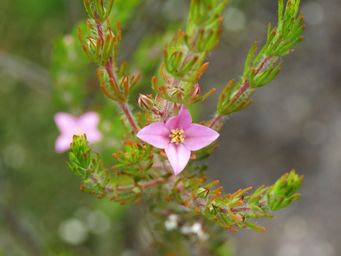
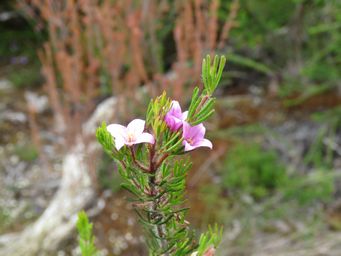
Boronia stricta
Four petalled slightly furry pink Boronia flowers growing along a hairy stem. Divided foliage is paired (opposite),
and each consists of five to seven fingers with slight hairiness and a scent. Plants can grow to 2.5 metres.
Seen in December
but can flower most of the year.
Northcliffe, and occurs close to the coast from Dunsborough to Cheynes Beach (east of Albany) and
a little way inland, South West and Great Southern regions Western Australia, favouring creeklines and winter swampy areas.
Bonamia erecta, Erect Bonamia
It appears that Bonamia erecta was thought to be the same as Bonamia rosea, until being named as a separate
species in 1987.
A trumpet shaped flower which may be cream or white, with the tube tending to yellow. Furry leaves, stems and buds.
These shrubs were more sprawling than the typical erect.
August
Seen at Agnew and south of Leinster, in the Leonora shire, and can
be found throughout the Pilbara, and further south into the Goldfields and into the Northern Territory.
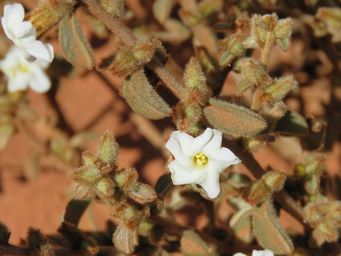
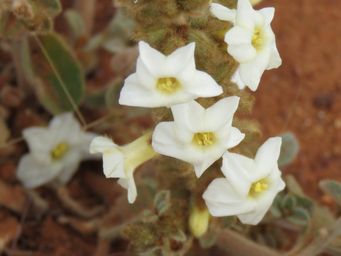
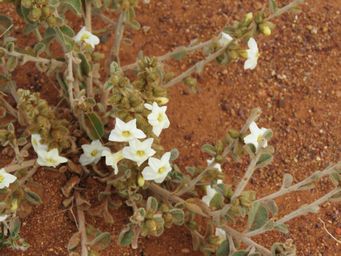
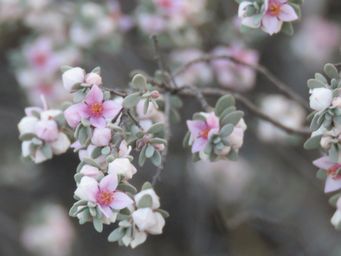
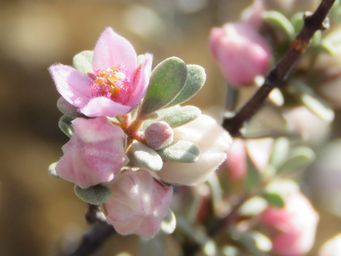
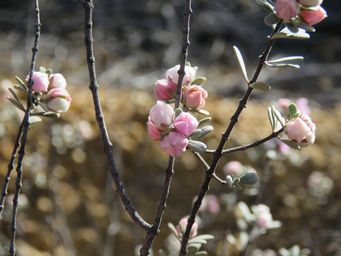
Boronia ternata
Of six varieties of Boronia ternata, only two are found in the Yilgarn shire; var foliosa and var ternata.
A soft pink
four petalled Boronia flower, with a hairy back of petals and around the edges. Leaves are oval and covered in fine hairs, giving
and aqua appearance. Leaves are in sets of three up the stems.
August
Moorine Rock, Shire of Yilgarn, and including all
varieties, the species is found through the eastern Wheatbelt, into the Great Southern and Goldfields.

















